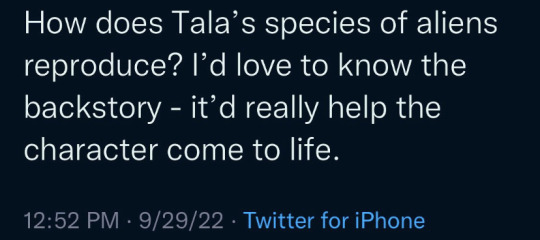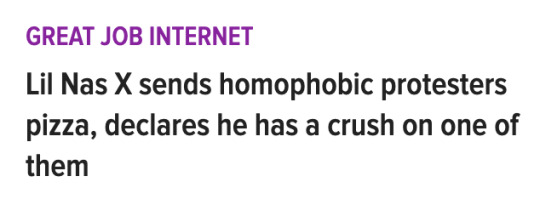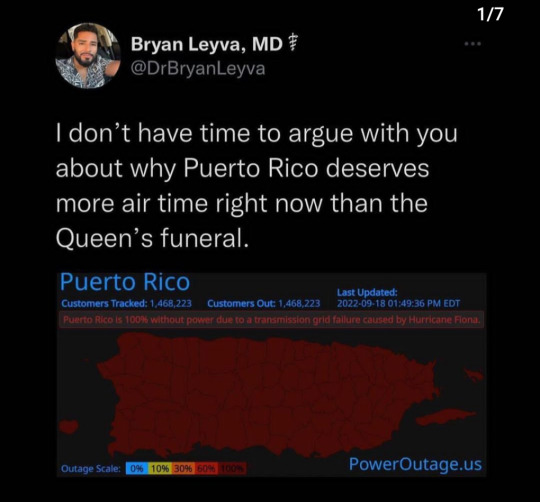Text
20K notes
·
View notes
Text

The toilets in this kebab restaurant making me feel like I’ve just joined cp_orange_restroom_x3
57K notes
·
View notes
Text



LIFE HACK: buy a budget 3d printer where one of its main flaws is “unable to house full-size filament spools” & then use it to print a whole new compartment attachment that allows it to house full-size filament spools 👍👍👍
24K notes
·
View notes
Text
((You aren’t vegan if you buy animals from pet stores or breeders))
116 notes
·
View notes
Text
In the club humbled by the totality of my ignorance
20K notes
·
View notes
Text

A library in britain created an alien mascot that uses they/them pronouns as part of a program to promote youth reading and terfs are now demanding the library explain how the alien fucks
51K notes
·
View notes
Text
transphobia is truly such a miserable mindset. to live in a world where no one is mutable and nothing can be abstract. no one can change or decide who they want to be or enjoy the wonders of modern medicine. everyone has to live and die by pointless kindergarten rules, but no one can reimagine themselves or create a different world. don’t you get tired of black and white and making up boxes and plugging your ears to the reality that nature is complicated and funny, and human hearts can feel infinitely?
59K notes
·
View notes
Text
non-muslims: please don't overcorrect for islamophobia by ignoring what is happening in iran right now (women being killed for not wearing or improperly wearing their hijab)
supporting the freedom to choose to wear a hijab means also supporting the freedom to choose not to
jîna mahsa amini was arrested and killed for "improperly" wearing her hijab. there are massive protests happening and police are killing protestors. spread the word.
64K notes
·
View notes
Text
Tomorrow maybe I will prepare my favourite dish, Rice With Ingredient
101K notes
·
View notes
Text
You have to have audacity in life. You must develop the strength to live the life you want. You must believe you are worth your best efforts because you are.
19K notes
·
View notes
Text

it makes me so mad people won't leave this poor kid alone but every single response he shoots off is funnier than if you gave me a week to think of one
117K notes
·
View notes
Text
what did we do to deserve portal 2. that shit was so good and for what
73K notes
·
View notes
Text
me [coming to terms with a truth about myself]: hm..................................................... unfortunate
84K notes
·
View notes
Text
A Review of Ben Shapiro's Short Story Collection
They are bad. This observation, like Ben’s work, is neither poignant nor original. I do not like Mr. Shapiro, and I will not claim to approach this review from a place of impartiality. To do so would be dishonest of me. At the same time, I wish to highlight the opportunity this collection represents. It would be easy –very easy– to tenderize the carcass of Ben’s work with endless blows about its gauche prose, clumsy theming, and slippery grasp of sentence structure, but to do so would be to grind a flank of rare and exotic meat into hamburger.
Right Wing Grifter Dickheads like Ben never shut up. They talk, they write, but it is truly rare that they attempt to create. Because creation, artistic expression, requires a degree of vulnerability that these types almost universally view as weakness. Try as he might, Mr. Shapiro cannot flense himself from his work. I am here to root around for the ambergris. Hold your breath.
As for what introduction the works may deserve, I must say I was surprised, perhaps even a bit proud of ben. My expectations were colored by my experience with his later work, specifically the exquisite quasi-fascist abortion that was True Alliegance. I think that in terms of overall quality, “Whats Fair” stands head and shoulders above True Allegiance, not simply for the (very) relative quality of its prose, but for its ability to go its 47 whole pages before vomiting up a cambion of racist caricature. This collection may be clumsy, but I am pleased to report that it lacks the intensely pathetic xenophobic temper tantrums of Ben’s later work. Maybe he was saving them up.
WHATS FAIR
If you wish to bake Ben’s opening story “Whats Fair” from scratch, google the top 50 or so most popular early to midcentury American novels, and pick out the ones you remember from high school. Fry the nuance out of Harper Lee, cut the edges off Stienbeck, throw in some raw chunks of Faulkner, season with a downright plagerous amount of Aruthur Miller, boil the whole pot into jelly, and serve in broken sentence structure.
“Whats Fair” is Ben’s attempt at being folksy, an attempt to assemble some rusty americana from books he vaguely remembers from high school. A hilarious thrust, given that if a cowboy were to sit down in a dusty saloon in the 1830s, and google “city slicker” the top result would be an image of Mr. Shapiro. The tone of the story is handled so improperly it is often downright comedic. It calls to memory the strange PR photos of Ben standing be-jeaned and stetson’d, leaning uncomfortably against the side of a 2018 ford F-150, its exterior flawless as a newborn soul. There are motions towards aesthetics, an infatuation with particular images of rugged americana, but a glaring lack of interest in the realities that spawned them. Phrases like “I’m out there, busting my hump to bring in the bread,” and “If he scuffed it up, he’d buff that scuff right out” miss the mark of authenticity by a margin so wide, they enter the realm of the uncanny and beautiful. The infatuation with these images of americana are not insincere, quite the opposite. Ben’s love for a particular image of America is deeply sincere, even aspirational. But images are only images.
The story follows Tommy (read: Ben) a young man in some unnamed rural American town. He’s a folksy down to earth type who just wants to play football. His older brother Jim is smart, and went to Insert Name of College to do all sortsa book-learnin. Several disasters fall like dominos. Their father dies, their mother spirals into grief and becomes unable to feed and bathe herself, Ben loses a football scholarship after a knee injury, and is left to handle the farm on his own while Jim attempts to perfect a new type of mill he says will revolutionize farming. Ben festers in his resentment for years. One night, Jim comes to Ben elated, saying that the mill finally works, that they’re going to be rich. It is at this moment that the resentment bubbles to the surface, Ben stabs Jim and kicks his body under the whirling plow blades, mutilating the corpse. The story ends with Ben attempting to sell the plow to a manufacturer, only to realize that he doesn’t know how to operate it. The potential buyer, and potential fortune lost, Ben sulks alone in the empty barn, lamenting his rotten luck.
I googled it. Ben, in real life, does not actually have an older brother.
Ben, in the story, is a sort of second fiddle. His father gives his older, smarter brother a watch, while he is given a hunting knife. Quote: “I didn’t really like my hunting knife. I wasn’t big like Jim then -- it wasn’t until later that I hit my growth spurt.”
This is the first of our recurring meta-themes. Ben Shapiro, often theorized to be insecure about his height, seems incapable of not creating protagonists that underwent the growth spurt he never got. Sharp-eyed readers will recognize this motif from the protagonist of True Allegiance, Brett “Bear of a man” Hawthorne, who also underwent a similar dramatic growth spurt. Seeing this motif repeated in Ben’s earlier work was oddly humanizing. In my mind, this is all but explicit confirmation that yes, Ben is actually deeply insecure about his height. I will say that I feel a degree of measured compassion for Ben in this regard, modern standards of masculinity are a prison. I will also say I would feel significantly more compassion for him, if he did not constantly use his media presence to perpetuate the exact toxic standards of masculinity he clearly suffers from. And thus the serpent consumes its own tail.
Speaking of unintentionally revealing story elements, there is a crucial domino of farcical tragedy that I left out of the earlier summary. We must now discuss our second meta-theme, Ben Shapiro and the erotic. Consider the following quote, in which Ben’s character takes home a girl for the first time: (Its formatting has been edited for clarity.)
“We walked up to the door and I took her in my arms. And that’s when Jim opened the door. He was back from State, where he was studying agricultural engineering, and he looked at me, laughing with his eyes, and said, “Hey, brother. I’m home.”
When I turned back to introduce Em, she was looking at him. They were married six months later.”
This scene became the central image of the story for me, the axis upon which the entire tale revolves. There is a sincerity to this scene that is not present in the rest of the work, which is reasonable. Losing a crush to someone else is an experience I think many people share, or can at the very least understand. This image of the stolen crush becomes a sort of map for the rest of the story.
Throughout the work, Ben’s older brother is depicted as a bit disconnected, a sort of high-falutin intellectual with every advantage in life, a man who sits in an air-conditioned barn all day, toying with his grand ideas of fantastic inventions while subsisting off the profit generated by the “real” worker, who is forced to live in a house with presumably the only girl he has ever had a crush on, now married to his older brother.
I will get this out of the way quickly: Yes, it is very funny and more than a bit sad that Ben wrote a story where his clear standin gets "cucked." However, to end the conversation here would be a disservice to the story, as there are elements to the work that go beyond the ordinary quasi-fascist insecurities around cuckoldry.
Psychosexual elements aside, there is a sense throughout the story that Ben’s character is nobly bearing a burden. Ben is stepping up, being the man of the family when nobody else has the balls to, while simultaneously being denied the “benefits” of his (gender) role. (read: a woman) He spends the majority of the book in masculine silence, never even attempting to voice his feelings to the rest of his family, and only ever speaking to his brother twice: after a fistfight, and before the murder. A murder, I will remind you, that comes immedeately after Ben’s brother excitedly tells Ben that the machine does work, and that they will be rich. This is no mere flight of fancy either. It is clearly implied by the potential interested buyer that the machine would have been a tremendous profit. Ben cannot allow his older brother to succeed. For his brother to succeed, that would mean that Ben wallowing in silent misery over the girl, the house, the farm, would have been for nothing. It would mean that he truly did not deserve the girl.
Even the climax, which on first read will likely come as a surprise, is explained by this dynamic. Ben, unintentionally I think, paints a fairly accurate picture of the sort of quasifascist incel despair that far too many of us are far too familiar with. It is the despondent temper tantrum of a man who sees himself as an ordinary, salt-of-the-earth everyman, but is in reality a manchild who plunges headlong into avoidable situations out of a childish idea of what he is owed.
All that said, let us be fair to Ben for a moment. The interpretation of the work that I have relayed is only a single interpretation. If the story does anything well, it is in the ambiguity as to who the reader is supposed to “root” for. Not to say that every story must have a clear protagonist, not at all. One could easily read the older brother as a hardworking, innovative capitalist who bootstraps himself above crass and proletarian activities like football and farmwork, only to be betrayed at the moment of victory by his jealous dullard of a brother. This interpretation would indeed fall in line with other quasifascist tropes of betrayal and entitlement. To this I offer a rebuttal; what about the growth spurt? In my mind, the younger brother’s growth spurt implies that he is a clear self-insert for Ben, and the intended target of sympathy from the audience.
Let us give Ben the benefit of the doubt. Let us say that he intended the story to end on a muddled note. If this is true, well done! Although, I suspect that sort of narrative hat trick is –and I am being generous here– a feat beyond Ben’s command of language.
“But who cares?” I hear you ask, “so Ben Shapiro wrote a bad short story, who gives a shit?”
What do we owe to an artist? Both I as a critic, and you as a reader, what do we owe to Ben Shapiro? I find myself returning to Roger Ebert, and the paraphrased maxim of “What’s it trying to do, and how well does it pull that off?” It is a method of analysis that assumes a certain level of clarity from the work. How can I judge Mr. Shapiro’s work by its goals, if those goals cannot be determined? Perhaps I lack the subtlety to understand Mr Shaprio. Perhaps Mr. Shapiro is simply a bad writer.
FROM THE PIT
From The Pit is an abortion metaphor, probably. It takes place in a near-future setting in which a wealthy plutocrat with a mortal fear of dust mites has invented a technology which allows exterminators to be temporarily shrunk to microscopic size to more effectively exterminate said dust mites. The story follows one such exterminator, who patrols the plutocrats home but is accidentally ingested by the plutocrat mere days before the process is supposed to wear off. The result is a game of cat-and-mouse between the exterminator attempting to escape before he explosively un-shrinks, and the plutocrats doctors attempting to kill him.
I liked this one. I genuinely and unironically liked this one. It is not a good short story by any means, Ben’s command of language still hovers roughly around the high school freshman level, and by god the story suffers for it, but it just has that spark. It has that absolutely unapologetic 100-miles-an-hour all-gas-no-brakes commitment to its fucking bizarre premise that I cannot help but fall a bit in love with.
I would even argue that Mr. Shapiro’s poor technical skill with writing actually helps the story. His incompetence with figurative language so thoroughly confuses the trite and annoying abortion metaphor that it becomes lost, causing Ben to stumble backwards into a solid 3/10 sci-fi short story.
There are several angles I could take here. I could take the psychosexual angle, and explore the bizarrely libidinal language of the exterminator being consumed. I could take the anticapitalist angle, and discuss the clearly unintended yet still on-the-nose imagery of a worker literally being consumed by the ruling class. I could even simply continue to make fun of Ben for writing another protagonist that is very small, and then grows. I think, as repayment for the fact that I actually kinda enjoyed this story, I will spare it from the ridiculous slings and arrows of half-serious literary criticism. I will allow the story to be bad in an uncomplicated way.
Ben, however, deserves no such mercy. Ben does not write, per se. His work reads like an extended description of a movie that he is acting out. It has the tone and pacing of an extended first-person chatroom RP in which Ben is a rugged action hero. “The mites are above me, but they haven’t sensed me yet. I take out my hook from my belt, and tear it into the cigarette wall with a satisfying thunk. Then I lash it through my belt and lean back.” The tone of this story is more action-focused, and it allows Ben to walk us through its narrative without trying anything too fancy and tripping over himself. The bare-bones prose serves its purpose, and nothing more.
It is difficult to spend this much time with an author without pondering why they write. I have trudged through far too much of Mr. Shapiro’s work not to at least consider the question. This collection was published in 2015. Ben was 31. Why write this? Ben wasn’t hurting for cash or notoriety, in fact, his career was seeing a bit of a renaissance. It is easy to suspect simple vanity, but I find the assumption crass. For all his faults, I would not call Ben a vain man. There are better things to call him. If given the opportunity, I would recommend “white supremacist” or “insufferable pissbaby.”
In Nathan Fielder’s The Rehearsal, a woman wishes to “rehearse” the experience of motherhood beforehand so she may prepare for her eventual marriage. Nathan spends an extraordinary amount of HBO’s money to build as close a simulacra of her perfect, idealized life as possible. The actors playing her children are swapped out regularly to simulate the experience of the child growing to 18. A garden is dug, and filled with crops overnight. All of the materials for a thriving home soap business are provided, complete with fake addresses for the woman to rehearse the process of shipping out completed packages.
What becomes rapidly apparent is that the woman in question has no actual interest in participating in the act. She refuses to engage with any of the difficult parts of her simulated motherhood. Crops go unplanted and unharvested, cookies go unmade, homemade soaps are left unshipped and hidden inside cabinets. The generous simulacra goes untouched, unmet in the middle. The fantasy and reality clash as they always will, sign and imagined signifier grinding against each other like a motorcycle accident against pavement. There is a violence here, and it leaves the real world feeling hollow and disappointing.
There is a sense that Ben wants to see himself as a writer, a sort of sharp witted renegade like a more intellectual Limbaugh, or a Hunter S. Thompson if he was afraid of women. Mr. Shapiro is paid well, and I suspect he has the time and resources to publish just about anything he wants. He can afford a good editor. He does not hire a good editor.
We have now entered the frontier of speculation, but I do not know how else to explain the bizarre disparity of Ben’s work. It doesn’t have to be bad. He could hire any number of editors, ghostwriters either, yet he does not, he opens the word document and decides to write his damn self.
There is a sense that Ben wants to see himself as a writer, but I think he is wholly uninterested in, even bored by, the actual craft of writing. Ben puts pen to paper like a bad date to the body, unconcerned with anything but facile self-gratification.
If you are wondering about the abortion metaphor, here: ““Yes,” says The Whale. “But it’s my body. And what’s in it is my purview. That’s the law. Look it up. But look it up after you call the doctor.” That’s it. Ben is able to maintain an allegory for slightly less than two lines. At least it’s over quickly.
UTOPIA
Utopia is the most literary of the collection. Let us call it Ben’s homage to the dystopian literature of the postwar era, literature Ben misunderstands with nigh-plagiaristic aplomb. Ben presents the reader with a sandwich of bagged white bread, filled only with thick and uncarved slices of Huxley, Orwell, and Lowry. All meat, no sauce. It is a sandwich I would accept with profound gratitude from a child, gracious humor from an adolescent, confusion from a young adult, and exhausted pity from a 35 year old man who styles himself a writer.
Why dystopia? I have always found the idea to be closer to the realm of poetry than fiction. Sophomoric readers of dystopian works will cut off their analysis at the point of “accuracy.” But a writer will select dystopia from their toolbox not for accuracy or realism, but for poetic exaggeration, for impact. This begs the question; what is Ben trying to hit us with?
“ALL MEN ARE CREATED EQUAL.’ He had seen those words somewhere before. They were hazy in his memory; they were a dream only partially remembered after waking up with bright morning light hitting his eyes.” Our opening paragraph is a bit of a tour through the world. People live under a big dome. There are ministries. People have menial jobs assigned by the government. Our protagonist's memories have been tampered with, though imperfectly. While the setting aesthetically resembles the imperious stalinesque conformity of 1984, there are dashes of shallow hyper-tailored beauty that would be more at place in The Giver, and invasive emotional regulation straight out of Brave New World.
Initially, I found Ben’s worldbuilding to be confusing, if not nonsensical. He seemed to pluck elements from better works with no rhyme or reason, and combine them with a similar lack of intent. Upon a second pass over the story, I realized my mistake: I actually understood the actual context of the novels Ben was inspired by. I was not thinking like Ben Shapiro.
Utopia is Ben attempting to write a “Liberal Dystopia”. Not in the sense of actual political liberalism, we are not discussing John Locke or John Stuart Mill, but Liberal in the minds of the mouth-breathing reactionaries who listen to Ben Shapiro’s podcast. That dragon called liberalism, bewoke and bepronouned, liveried in blue hair and pronouns, both spineless centrist, antifa supersolider, and Soviet Apparatchik. This is the terrible architect of Ben’s Liberal Dystopia, a premise so firmly in the realm of self-parody I initially considered it too embarrassing to be Ben’s actual goal for the text.
I am forced, for reasons that we will discuss later, to summarize significantly more of the moment-to-moment action. A quick summary of this story like I have done previously would read as utterly nonsensical.
Our protagonist watches the sky during a state mandated skywatching session. Halley's comet appears in the night, the sight triggering something in our protagonists mind which causes him to partially break free of the programming and flee into the night. The protagonist is pursued by an “Enforcer” in an “Enforcement Pod”. Initially, the protagonist is deeply afraid of the pod, as it is armed with “The Pulse”, a sonic weapon capable of inducing powerful seizures. However, it is revealed that The Pulse has no effect on the protagonist, as “He was not like that girl, he suddenly realized – a shocking realization, for he had always been like everyone. He was not like the slack-jawed Enforcer.”
A triumph of storytelling. I am going to mock this, because Ben has previously demonstrated that he is actually capable of writing competent action scenes. He could have made this scene not suck, but simply chose not to out of what I presume is laziness. In From The Pit, Ben actually gives the audience a tour of the exterminators kit. By the time things get tense, we as readers understand the tools the exterminator has at his proposal, and how they could potentially be used. As the characters mind races, wondering how they are going to escape the danger, the audience is doing the same thing. This is engaging!
Our protagonist is simply not like other guys. He is a special boy with a special brain that makes him immune to the weaponry of the lobotomized police. This dystopia shit is easy. Just remember; if you’re ever struggling under the bootheel of an increasingly authoritarian police force that seems only to delight in the most violent and sadistic execution of their duties, just be a special brain boy like the protagonist.
Said special brain boy moves to the edge of “The Bubble”, the large dome built over “The City” like a greenhouse to keep the climate controlled and livable. He sits by the edge, unaccosted by the police, until a door in The Bubble opens, revealing a barren wasteland. In the distance is a mountain, which the special brain boy is drawn to, presumably because of his special brain.
Special brain boy approaches the mountain, and finds the entrance to a cave, above the entrance to which is carved the words “THE CREED OF IGNORANCE”. This is a reference to a Winston Churchill quote “Socialism is a philosophy of failure, the creed of ignorance, and the gospel of envy, its inherent virtue is the equal sharing of misery.” Somehow, I suspect that there is no narrative reason for the placement of this quote on the side of this mountain. I suspect that it may have found a place in the story because Ben found the quote to be “based.”
Inside Churchill’s cave of anticommunism, we find a marble room featuring many bookshelves and a wrinkled decrepit man who “looked a little like a gnome, withered and malevolent.” Who explains the protagonist’s special brain boy powers were presumably triggered by the sight of Halley’s comet, despite the fact that the comet only arrives every 75 years, possibly implying that the protagonist is at least 75 years old. The decrepit gnome man and the protagonist have an insufferably cryptic conversation that explains the central thrust of the work.
I have to hand it to Ben, this one was a doozy. Here, the decrepit gnome man explains that in the past, people tried communism, but it didn’t work. I will spare you the specifics of the decrepit gnome man (read: Ben’s) logic here, but suffice to say that it relies on the belief that some races and ethnicities are simply inherently, biologically worse at some things, as inherent biological differences are an eternal source of conflict yadda yadda yadda. Yes, the reason I am forced to recount the moment to moment action of this story, the reason a bare summary would be unreadable, is because the primary driving narrative force of the work is the protagonist having race memories.
The decrepit gnome man goes on to explain that people are unhappy because they want things, and that therefore, the solution was to apply a nonspecific eugenicist-cum-lobotomy type thing that would breed out the special genius brain boy genes in humans that make them want things. Quote “Equality cannot be achieved in excellence. It can only be achieved in mediocrity.”
It should be said that this is not just Ben writing a pastiche of what he thinks his enemies believe, this is Ben writing about what he is afraid of. To the ruling class and their lucky toadies, this is what cries of equality sound like. Not a desire for a better life, but the mad raving of a tide of jealous morons who were simply not smart enough, not excellent enough, to achieve the wealth and excellence that Ben Shapiro achieved.
After the decrepit gnome man is finished, two enforcers appear at either side of special brain boy. Decrepit gnome man asks “are you happy?” When special brain boy nods. The enforcers attempt to grab him, but his brain moves so fast now that hes able to beat them up with his special brain boy powers. In his fervor, he grabs a heavy book off a nearby bookshelf, and bludgeons one of the enforcers to death with it. In a moment that induced what I can only describe as a weapons-grade eye-roll, the book is revealed to be the Pentateuch.
Special brain boy suffocates the old man with a pillow, and even though special brain boy has not read the Pentateuch, and does not know who or what God is, he says to the dying man “May God forgive you.” He takes his Pentateuch, and wanders off into the desert, presumably to start anew.
---
What do we owe to Ben Shapiro? This phrase is stuck to the underside of my mind like used gum. It haunts me. This review was originally intended to be a silly diversion from my normal work, two days out of the month to use Mr. Shapiro’s work as a punching bag for two or three thousand words. Yet, something about Ben’s writing has turned me inward. I find myself reflecting on my own work, on my relationship to art.
There is a vulnerability that comes with creation, but this goes both ways. Analyzing an author's work will inevitably reveal things about the author. Whether it be through the text itself, or through supplementary learning, there is an intimacy to criticism that often goes overlooked. I find myself holding a vulnerable piece of Ben Shapiro, one that he likely never intended me to have, and I find myself at a loss as to what to do with it.
Is it butchery? To whittle that piece of Ben into a scalpel and turn it back against his work? To cut open his corpus with the intent of “learning”? How would I feel, if a critic of my work went to such lengths as to discover some deep-held insecurity, and apply it to a deconstruction of my work? How would I feel if they were correct? How would I feel if their retooling of my own private vulnerability did actually provide a deeper understanding of my work? What good does it do anyone to lay Ben’s organs out for the world to see?
But, come on, this is Ben Shaprio we are talking about here. This isn’t some independent creator or outsider artist baring their heart to the world, this is Ben Fucking Shapiro. I am not going to pretend that Ben would ever extend the same level of attention and care to my work, and how could I ever separate someone like Ben from his work, especially when its context is so explicitly political? Claiming some loftier artistic goal by criticizing Ben's work would be pretentious.
And yet, I have this piece of him in my hand, and I still do not know what to do with it.
I am a curious person. The greatest compliment I can give a piece of art, is that it instilled in me a desire to know more. That is love, I think. There is love in a desire to know, to understand, in the process of study.
I have always seen myself in outsider artists. Sometimes I find myself exploring the backpages of Newgrounds and Youtube, searching for videos made by children about their original characters. Behind every handmade MSpaint drawing of a robot dragon is hours of work, and a burning, overwhelming, desire to create. This child has never read the Iliad, they do not understand the western canon, or conventions of storytelling, or three act structure, yet here is a tale, beautiful and captivating as any other! I find myself falling into their body of work, pulled in by this desire to understand the beauty this little author finds in the world. I find the pretensions of my craft melting away. Sometimes, for a brief moment, I see the forest for the trees.
Is this love? This little piece of Ben Shapiro I hold in my hand, is this love? I think so, to a point.
I think that beneath everything, beneath the politics, beneath the garbage prose and quasifascist whining, I believe that we at least owe Ben one thing: A desire to understand. Sometimes, to understand something, you have to tear it apart.
--
Thank you to my patreon subscribers, who made this review possible. If you'd like to support me, my patreon is pay-what-you-like, every tier from 1$ to 20$ gets full access to my notes and drafts.
Our next sub goal will be a full analysis of My Immortal as if it were an alchemical manuscript.
#makes me think of a couple of lines i can't place completely that go like#''when i finally understand them -- i love them. and then i destroy them.''#and i think it was written as this... idk sad kind of begreived regret about how the character had to interact with the other characters#and i saw in myself that same tendency and so also -- unfortunately i think -- took that same connotation of it#regretful distaste for my own critical -- of myself and others -- tendencies because they came from an understanding which also bore love#but the way you write this very similair... idk what you call it... (para)social interaction with an other...#you recast the connotation quite successfully from one of regret to one of tentative acceptance#but also notably shifting the target of the connotation from the destruction to the love#whereby making the destruction an antecedent to the recognition of one who desires to create but who is also so deeply misled#anyways ive rambled long enough in the tags ( and i sincerely apologize if it was too long ) 😅
13K notes
·
View notes
Text
the key to being a hater and not have it be corrosive to your spirit is that you gotta balance it out by openly loving things too. trashing shit is only respectable if you’re also capable of joy and not just oozing negativity 24/7. also when you’re being positive you’re not allowed to do it with ironic detachment. all sincerity all the time babey
57K notes
·
View notes




